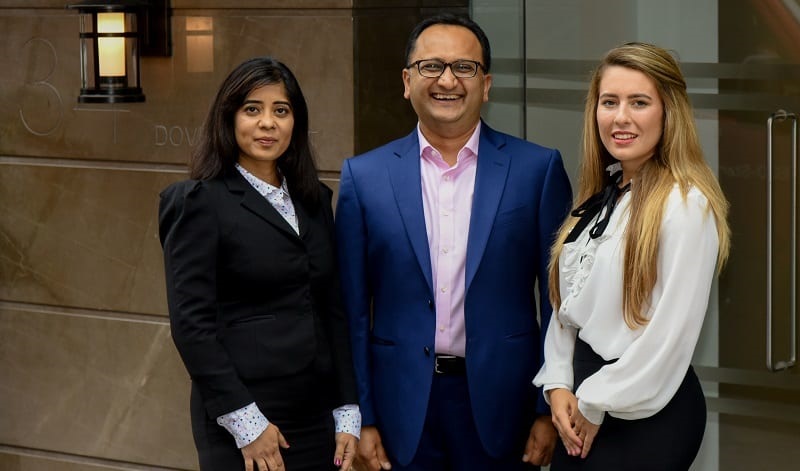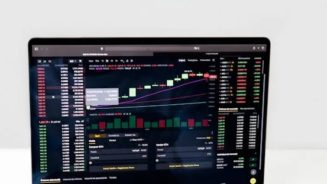Sun Global Investments’ wealth management arm started life in the UK in 2012 offering a bespoke service to high net worth Indian expats. Six years down the line, it is ready to further its reach both geographically and technologically.
Head of private clients Udit Garg (pictured with vice-president of wealth management Shruthi Rao, left, and assistant relationship manager Danielle Oates) has spent the past 10 years in the UK, having moved to London in 2009 with a firm called Client Associates, which at the time was India’s largest family office.
Garg set up the UK operation and began acquiring clients from the pool of non-resident Indians living in the country. He joined Sun Global Investments in 2011 to set up the wealth management desk within the asset management business. As part of this, he brought across about 85-90% of the clients from his previous shop.
At present, Sun Global’s wealth management arm looks after 52 clients, the top 20 of whom account for about 80% of the firm’s $350m (£269m) book. The firm does not run risk-rated products and works together with BNY Mellon subsidiary Pershing to offer clients their own segregated portfolio accounts. It also liaises with individual families’ existing private banks or facilitates new relationships with private banks.
“If we understand you well, the portfolio will be based on your needs,” says Garg.
Typical clients of the multi-family office are second or third-generation Indians, often professionals or those running large businesses. The customer service model that has evolved is, according to Garg, reminiscent of the direct banking model of the 1980s: bespoke, personalised and holistic.
That often means becoming acquainted with the whole family and offering services suited to each member as required. Managing money is number one priority but other services can be delivered. This can include helping clients secure the best college to integrate them back into business, as well as help with wills and trusts for which Sun Global will work with third-party accountants and trustees.
“It becomes a fully-rounded platform,” says Garg. “It’s very much like the good old ’80s model, which is non-existent today.”
Sun Global’s emerging markets expertise
For investment expertise and ideas to fill portfolios, the team taps into Sun Global’s investment advisory desk, which comprises three people tasked with uncovering the latest investment ideas and products available in the market.
Unsurprising given the firm’s roots, Sun Global specialises in emerging markets. In fact, Garg estimates between 30% and 40% of the new idea generation comes from developing economies. He says the firm is one of the largest issuers of masala bonds in the market. In 2016, it was part of a joint initiative with Dubai-based Emirates NBD Bank and India’s ECL Finance, which rolled out the first of these bonds to the international wealth manager marketplace.
Masala bonds are securities issued outside of India but denominated in rupees rather than local currency. Garg likes them because the bondholder rather than the issuer takes the currency risk.
He says: “Despite the rising interest rate scenario, masala bonds are of short duration, so we mitigate one of the big risks attached to rising interest rates.”
In May, Sun Global acted as joint lead manager alongside Barclays Bank, UBS and Yes Bank for India’s Dewan Housing Finance, for listing a $150m five-year masala bond on the London Stock Exchange. The rationale is that affordable housing in India remains one of the most straightforward bull stories in Asian equities.
Outside of emerging markets, Garg says US equities have been in favour for the past 18 months but that global fixed income has been less revered, although with rising rates issuers are starting to offer higher coupons.
He says the Sun Global portfolios hold some American depositary receipts, which are stocks that trade in the US but represent a specified number of shares in a foreign corporation. This tends to lead to a large market cap bias and names that are highly rated locally, including Indian IT firm Infosys and Indian bank HDFC Bank.
Speaking about the approach to market cap size, he says: “There is a risk. No matter how much transparency you want from a company, it becomes opaque beyond a certain point. So, you might as well draw a line and say, this is our cut-off number.”
Sun Global also runs the $22m internal Albatross Fund. The fund claims to offer liquidity to clients within seven days, although in reality this is more like three or four, which Garg believes is integral to every client portfolio.
“You never know when a client needs ‘X’ amount of money, and that ‘X’ is a defining piece of discussions in meetings. We keep the ‘X’ in a liquid fund, which gives a minimum yield but also provides some immediate liquidity. “I would say it is 10% of our total portfolio because that’s the liquidity need we have created for our group.”
Green Innovation in club-style deals
Portfolios also contain what Garg terms private equity “club-style deals” and he has witnessed an increasing appetite for green investments.
Sun Global has invested some clients in a company called Smixin, which creates handwashing devices that claim to use 90% less water and 60% less soap. “It’s got great pedigree because the founder of that company, Elmar Mock, is one of the original founders of the watch company Swatch,” says Garg.
A smaller investment is in a Swiss company that specialises in disintegrating tyres and reusing the residue to make other products, although this is in its infancy. About $17m of client money is invested in these two companies.
Garg says it takes time to convince clients of the merits of going green and often what seals the deal is when they see the technology behind these products. In the case of Smixin, it was seeing a sample tap.
“It has actually been used in a lot of KFC outlets in Asia, where there is more of a water issue,” he explains, “and we are focusing on Qatar for the World Cup in 2022 where water conservation will be a big thing.”
Philanthropy is another area of focus for Sun Global and Garg estimates about 40% of the client base is interested in such activity.
Plans are afoot for one group of investors to launch an initiative to provide free meals to the homeless across every tube station in London on every day of the week. Some of Sun Global’s largest investors have offered to allocate 5% of their portfolio’s annual growth to fund the venture.
“It’s a monumental task, first to set up a charity and have it approved at various levels before getting the group together to decide on the logistics. Who’s going to cook the food and who’s going to distribute it, etc. We will probably start with a pilot scheme and go to two or three stations around the area where the kitchen will be to see how it goes.
“The response has been amazing and everyone wants to pitch in. Philanthropy doesn’t come naturally to most people but it has begun to come to the fore in this group.”
Spin-off from Sun Global Investments
With regard to winning new business, Garg says the group is attempting to win contracts all the time but does not go out and solicit business. In this industry, new clients tend to come from introductions. This is the reason he believes the business has grown slowly and steadily up to this point.
However, the company has its sights set on further expansion through mergers and acquisitions, although Garg does not have a takeover target in mind. “Our next stage will be inorganic growth, when we will be acquiring or hiring. We also have a franchise in place and are looking to set up franchises around the UK.”
At present, the firm’s coverage is about 80% in London and 20% outside the capital. Garg says the company is expecting to spread its tentacles across the UK during the next two years, to cover towns such as Leicester, Leeds and Newcastle, and into Scotland and Wales.
The plan is also to spin off the wealth management business as a separate entity from Sun Global Investments, and discussions are now under way between the board and shareholders. As part of this evolution, the company has been embracing technology, though Garg admits it has not been easy.
Implementing certain streamlining features, for example consolidating five different statements into one page for clients, has taken time. “All those five statements speak a different language and to put them all into one easy tech-savvy, tech-friendly format has not been easy for us,” he says.
The firm recently adopted software from a provider in India to assist with the roll-out and to position the firm to cater for the next generation of clients. “I would like to meet my relationship manager as often as I can in a face-to-face meeting to discuss and implement, but my daughter or son would probably want something easier to use.”
In addition, Sun Global is looking to launch an asset allocation tool next year that allocates 10% of portfolios using artificial intelligence and is based on how a client answers a series of questions. “There’s no human touch involved, it’s all mechanised,” he says. “We have contracted an entity to do this for us. It will be at pilot stage towards the end of 2018 and I’m pretty sure it will be live at some point next year.”
Biography
Udit Garg has worked in the financial services industry for more than 20 years. He started his career in a family business in Delhi before moving to Mumbai, where he worked in health insurance and then with Citibank India. He moved to London in 2009 with Indian multi-family office Client Associates, leading its London operations until 2011. He then joined Sun Global Investments as head of the private client business and relationship manager.










